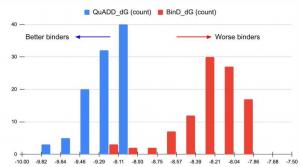PolarisQB published a manuscript demonstrating the superiority of quantum computing over AI in Drug Design
DURHAM, NC, UNITED STATES, November 12, 2025 /EINPresswire.com/ -- Polaris Quantum Biotech (PolarisQB), a leader in quantum-enabled drug discovery, today announced the publication of a preprint, “A Comparison of Small Molecule Generation Methods in Structure-Based Drug Design: Artificial Intelligence vs Quantum Computing” by Dr. Kendall Byler, PolarisQB Director of Chemistry, and Dr. Shahar Keinan, PolarisQB CEO. The paper presents a detailed comparative analysis of two advanced computational paradigms for small molecule generation: the company’s proprietary Quantum-Aided Drug Design (QuADD) platform and the AI-based Bond and Interaction generating Diffusion model (BInD).
The study evaluates both frameworks on their ability to generate novel, structurally diverse, and biologically relevant molecules within a defined protein binding site. Results indicate that while BInD successfully produced a broader chemical diversity through reverse diffusion-based generative modeling, QuADD achieved superior optimization of physicochemical and pharmacophoric characteristics specific to the target environment. Molecules generated by QuADD demonstrated higher predicted binding affinities, improved druglike property scores, and more consistent replication of key binding interactions compared to BInD.
The QuADD SaaS platform from Polaris Quantum Biotech is a revolutionary drug discovery tool that integrates quantum computing and artificial intelligence to rapidly optimize and identify novel small molecules. It utilizes quantum annealing to explore a chemical space of up to 10^30 possible molecules, accelerating lead discovery far beyond classical methods. Users can define protein binding pockets and ligands, and QuADD generates libraries of 1,000–10,000 candidate molecules, all optimized for critical drug-like properties such as blood-brain barrier permeability, solubility, toxicity, and metabolic stability.
These findings confirm the efficacy of quantum-assisted optimization in addressing multi-objective problems inherent to rational drug design. By leveraging quantum computing to navigate complex molecular energy landscapes, QuADD offers a scalable and reproducible approach for identifying high-value lead compounds in early-stage drug development.
“Quantum-Aided Drug Design (QuADD) is not a promise for the future; it’s here and delivering results today. While the current AI craze produces vast numbers of molecules that often fail basic drug-likeness or synthetic tests, QuADD’s quantum optimization consistently generates real, synthesizable candidates with superior binding and pharmacological properties. This is what true innovation in drug design looks like: quantum computing in production, outperforming AI in both speed and scientific rigor," says Dr. Kendall Byler, PolarisQB Director of Chemistry.
For PolarisQB, this work validates the power of next-generation computational platforms, such as QuADD, to push boundaries in dynamic catalysis and structural flexibility, opening doors for more innovative, faster drug development and entirely new therapeutic strategies. The era of quantum-enabled chemistry is here, and PolarisQB stands at the forefront.
For inquiries or to request a copy of the publication, please contact info@polarisqb.com or visit www.polarisqb.com.
Polaris Quantum Biotech (PolarisQB), a leader in Quantum Computing for drug discovery, created the first drug discovery platform built on a Quantum Computer, Quantum-Aided Drug Design (QuADD). Founded in 2020 in Durham, North Carolina, PolarisQB utilizes the latest advancements in quantum and cloud computing, artificial intelligence, and machine learning to identify drug lead molecules from a chemical space comprising 10^30 molecular options. The QuADD platform can search a massive chemical space and deliver molecules specific to on-demand libraries, as well as de novo space. Final candidates, identified in minutes, possess custom drug-like characteristics for the discovery project and are represented in 3D conformations within the target protein pocket. Additional information is available at www.Polarisqb.com.
Shahar Keinan
POLARISqb
+1 202-246-2332
email us here
Visit us on social media:
LinkedIn
Legal Disclaimer:
EIN Presswire provides this news content "as is" without warranty of any kind. We do not accept any responsibility or liability for the accuracy, content, images, videos, licenses, completeness, legality, or reliability of the information contained in this article. If you have any complaints or copyright issues related to this article, kindly contact the author above.


